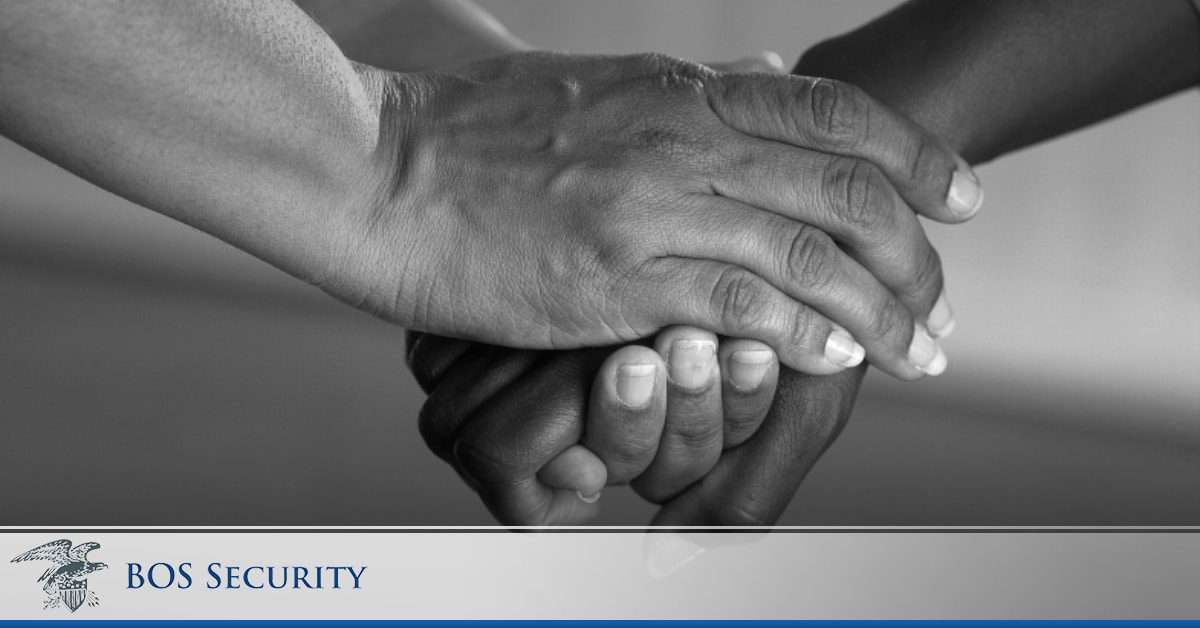When many people think of security officers, their minds may go to the friendly and alert guard at the front door monitoring comings and goings. Or maybe they picture a well-trained armed guard working closely with the police to keep people safe from dangerous and violent criminals. But do they consider that their training, powers of observation, and quick thinking could prevent someone from harming themselves and give them another chance at life?
How Security Officers can Help
Last year two BOS Security guards, Officers James, and Elizabeth Hilton, were honored by the Mayor and Commission of Athens-Clarke County because their quick response helped to save a young man’s life by preventing him from leaping off an eighth-floor balcony. We are discussing this incident now, not just because we continue to be proud of our officers, but also in honor of National Suicide Prevention Month. BOS Security wants to remind people that security guards can be an ally if you or a friend are considering self-harm or believe you may be witnessing such an event. Officers can call for help while keeping everyone calm and preventing the situation from escalating. It’s just one more of the many kinds of incidents BOS guards are trained for.
Besides notifying a guard, 911, or any other source of help, here are some other ways you can help someone at risk of suicide. According to the Suicide Prevention Lifeline, they include:
- Talking to them so they know they are supported and not alone. It may reduce rather than increase suicidal ideation.
- Reducing the availability of lethal means. Studies indicate suicide rates by that method tend to decline and do overall suicide rates.
- Help them build a support network. Options that include a variety of resources and support individuals can help them see they have alternatives without feeling like a burden on just a friend or two.
- Stay in touch especially after hospitalization or other intervention. It can prevent at-risk individuals feel abandoned or that they are supposed to be “cured.”
Risk Factors
These are not predictors of suicidal behavior or ideation, but they’re important to be aware of:
- Some mental disorders, mood disorders, or personality disorders
- Alcohol and other substance abuse
- Hopelessness
- Impulsive and/or aggressive tendencies
- History of trauma or abuse
- Major physical illnesses
- Previous suicide attempts
- Family history of suicide
- Job or financial loss
- Loss of relationship(s)
- Easy access to lethal means
- Local clusters of suicide
- Lack of social support and sense of isolation
- Stigma associated with asking for help
- Lack of healthcare, especially mental health, and substance abuse treatment
- Cultural and religious beliefs, such as the belief that suicide is a noble resolution of a personal dilemma
- Exposure to others who have died by suicide (in real life or via the media and Internet)
Warning Signs
These behaviors don’t necessarily suggest suicide is imminent, but if they are new or increased, pay attention. If you are concerned, get help – from the Lifeline, 911, or a security officer.
- Talking about wanting to die or to kill themselves
- Looking for a way to kill themselves, like searching online or buying a gun
- Talking about feeling hopeless or having no reason to live
- Talking about feeling trapped or in unbearable pain
- Talking about being a burden to others
- Increasing the use of alcohol or drugs
- Acting anxious or agitated, behaving recklessly
- Sleeping too little or too much
- Withdrawing or isolating themselves
- Showing rage or talking about seeking revenge
- Extreme mood swings
Why Involve a Security Officer?
First responders can take a while to arrive and the Suicide Prevention Lifeline can walk you through how to help, an on-site guard is right there with you to speak to the at-risk individual in-person and even restrain them until help can arrive if needed. They can be a helpful part of your team when trying to prevent someone from taking their life.
The BOS Security Difference
BOS Security professionals are experienced, vetted, and receive the highest levels of training from certified instructors. The training we provide is customized to the situation an officer is likely to encounter on duty. Contact BOS Security today!
